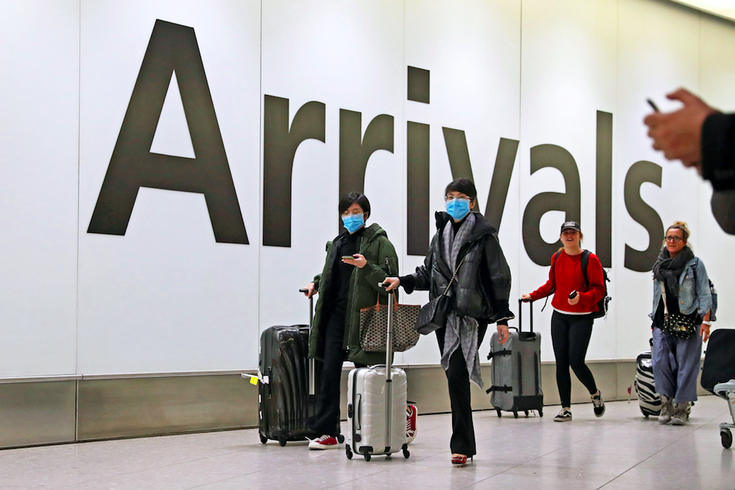
By Nancy Gillen |
As a news website that covers all global sport, insidethegames began to write about coronavirus at the start of January, when the International Olympic Committee began monitoring the Asia and Oceania boxing qualifier taking place in Wuhan in February.
This event was cancelled days later, the start of a domino effect which has now seen nearly all sport suspended in an attempt to prevent the spread of the virus.
Sport has been so impacted by coronavirus due to its popularity and its global nature. It attracts thousands of people to events, while also requiring athletes, officials and staff to travel across or between countries. Sport subsequently becomes somewhat dangerous during a pandemic.
This is highlighted by the sporting events that took place as the pandemic began to emerge and are now being attributed to hundreds of cases. Fabiano di Marco, the chief pneumologist at the Pope John XXIII hospital in Bergamo, has called the Champions League football match between Atalanta and Valencia a “biological bomb,” for example.
The game took place on February 19 at the San Siro Stadium in Milan, with around 44,000 fans in attendance. It was branded as one of the biggest matches in the history of Atalanta, a club based in Bergamo.
Just two days later, Italy reported its first case of coronavirus, before numbers exploded in the province of Bergamo a week later. It became one of the first areas to go into a state of lockdown in Europe, let alone Italy, and is now still struggling to deal with the pandemic.
Contagion was also reported in Valencia soon after the match, with one of the journalists who travelled to the match becoming the second person to test positive for coronavirus in the region. It was then revealed that more than a third of the Valencia squad had also been infected.
Experts such as di Marco have now credited that match with the devastating acceleration of the virus in Italy and elsewhere.
The same has been suggested for the staging of the Cheltenham Festival in England. The four-day horse racing meeting from March 10 to 13, attended by around 250,000 people, took place as planned, despite the postponement of other competitions such as the Premier League.
Although event organizers were complying with Government guidelines at the time, British people were told only a week later that they had to stay inside unless it was essential. There are now fears that the Cheltenham Festival may have increased the spread of coronavirus.
As such, it is evident that sport has had, and continues to have, a strong responsibility during the coronavirus crisis. Earlier incidents have shown how much sport can contribute to the worsening of the pandemic, and so it must not be resumed until it is absolutely certain that it is safe to do so.
Even with the majority of events and competitions now suspended, sport continues to have a responsibility in cheering up millions of people in lockdown. All across the world, broadcasters and teams are replaying iconic matches or memorable tournaments to keep sports fans occupied. The social media accounts of the teams involved are tweeting along with the events in real time, further enhancing the use of sport as an escapism.
For those who are more used to participating in sport themselves, Olympic and world champions have been sharing their favourite indoor lockdown workouts on Twitter and Instagram. Athletes have also been engaging in TikTok or social media challenges to keep viewers entertained.
Sport stars are also having a direct hand in dealing with the crisis. Many have donated large sums of money to charities or protective equipment to health care systems. The names include Argentinian footballer Lionel Messi, American basketball player Stephen Curry, tennis players Roger Federer and Simona Halep, and Irish UFC star Conor McGregor.
It could be argued that this is the least multi-millionaire athletes can do, but it is still an act of goodwill that confirms sport can play a positive role in quelling the pandemic, even when competition itself is at a standstill.
When this pandemic is over and done with, it will be interesting to look back on sport’s unique place in the crisis. It is undeniable that it plays a vital role in reducing the spread of coronavirus, simply by not taking place. Incidents like the Champions League match between Atalanta and Valencia and the Cheltenham Festival show the negative impact sport can have on the situation.
It can also clearly have a positive role, however, whether that is through replayed tournaments or online workouts. Sport stars also have the chance to show great social responsibility in how they react to the pandemic.
And once it is done, sport will symbolize the greatness of human determination through adversity. With the Tokyo 2020 Olympic and Paralympic Games now taking place in the summer of 2021, it will be the perfect opportunity to celebrate coming out the other side of the coronavirus pandemic.
Republished with permission from insidethegames.biz.